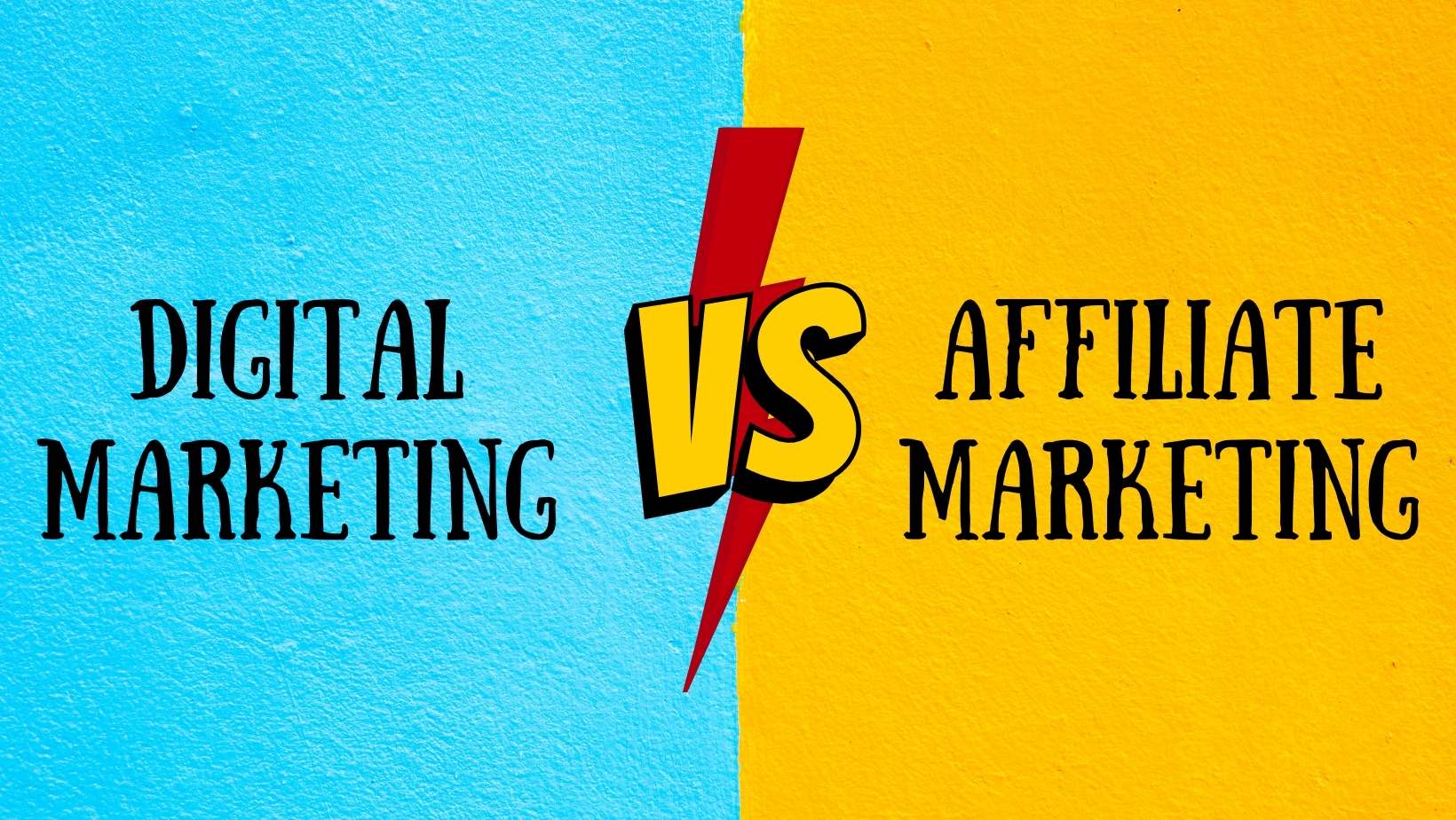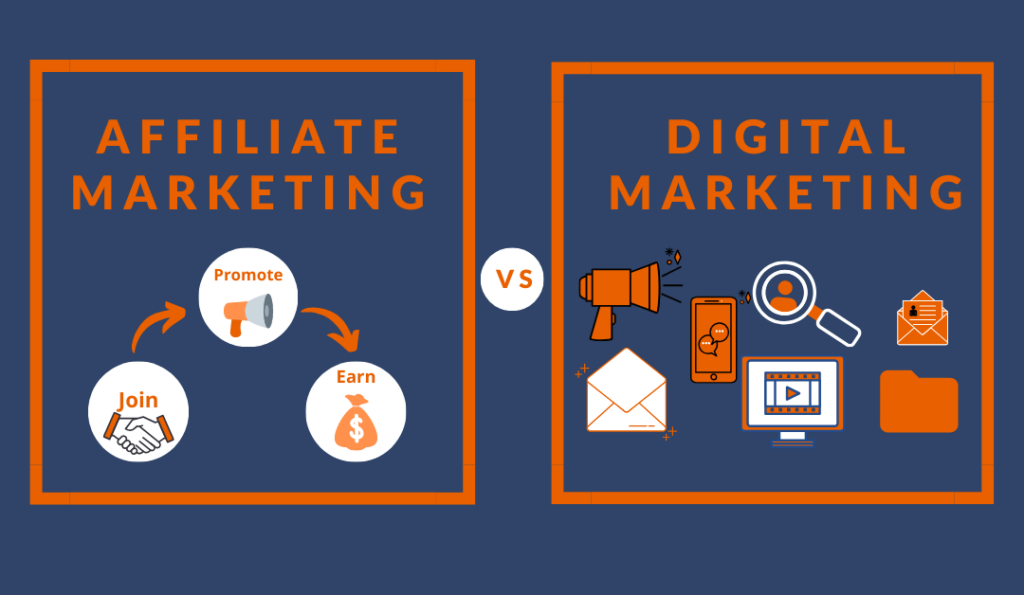
Affiliate marketing and digital marketing are both valuable marketing strategies. Each of these strategies helps to accelerate online businesses, increase outreach, build brand awareness, and boost sales. Some of the world’s biggest high-growth companies and small businesses use these marketing strategies to generate positive results and improve their brand image.

From Nike to Apple, Chanel to Coca-Cola, no brand or business doesn’t have an online presence or doesn’t invest in marketing to boost image and sales. However, not every company can use the same marketing strategies at the same time – it depends on what its goals are. For example, a health-protein bar brand might want to increase its social media presence, whereas an insurance service might be looking at boosting its online search engine ranking. Therefore, companies must use different marketing strategies to achieve their end goal.
The following table looks at the differences between affiliate marketing and digital marketing, their advantages and disadvantages, and what marketing strategy works best for a business.
| Affiliate Marketing | Digital Marketing |
| A type of digital marketing that focuses on attracting and engaging customers to improve sales. | Several methods for advertising products and services across many platforms like social media, blogs, websites, etc. |
| Involves making commission-based sales based on traffic generated. | Involves engaging consumers and prospects. |
| Methods include unattached, related, and involved. | Methods include content marketing, PPC, social media marketing, email marketing, and SEO. |
| Leverages celebrities, influencers, experts and thought leaders to promote products and services. | Leverages brand owners, marketing agencies, and in-house marketing consultants to deploy strategies |
Here’s a broader look at these two types of marketing strategies –
Affiliate Marketing
Businesses engage with affiliate marketers to build product or service awareness in this marketing method. Affiliate marketers use links on their websites and blogs that redirect traffic to another company’s product or service offerings. In return, they earn commissions on each converted prospect.
Affiliate marketing is a form of advertising and a type of digital marketing. In this strategy, several agents are involved — the affiliate marketer or network, the channels or platforms used and the end consumer.
How to get started? Affiliate marketers need to create websites or blogs or join affiliate networks that may be relevant to their audience.
Many marketers and businesses prefer affiliate marketing for the following reasons –
- Flexibility: Since affiliate marketing is commission or performance-based, marketers and businesses can choose the volume of links they want to embed, the kind of traffic they want to engage, or the number of payouts involved.
- Enhances visibility: Affiliate marketing is an excellent strategy to enhance a brand’s visibility. Marketers help businesses by promoting them through links to as wide an audience as possible.
- Specific target audience: A business can target a particular audience through affiliate marketing. Instead of reaching a random audience, affiliate marketers use analytics to understand customer profiles and try to engage with specific prospects and consumers who are more likely to convert.
- Measure performance easily: There are many tools and software that affiliate marketers use to measure performance. They can easily monitor progress and track the number of site visits, impressions and clicks. Monitoring gives businesses a more holistic understanding of the marketing campaign’s strengths and weaknesses.
Digital Marketing
Digital marketing involves using online platforms and channels to market a brand or its products and services. Digital marketing is a broad term that houses several marketing strategies, such as social media marketing on platforms like Instagram and Facebook, email marketing using drip campaigns or triggers, search engine optimisation, content marketing, etc. This marketing strategy involves the following agents – product or service, digital channel, and the consumer.
How to get started? A business must first identify what marketing strategy it wants to adopt and what goals it wishes to achieve to get started with digital marketing. Based on these identifiers, it then needs to zero in on the digital marketing strategy which will work best for it.
Digital marketing has gained wide popularity in the last few years for several reasons, such as –
- Cost-effective: As a highly cost-effective strategy, digital marketing is highly preferred among many businesses and marketers. One can easily experiment and trial different types of strategies to understand which one is giving the highest return on investment or return on ad spend.
- Quick publicity: Brands and businesses get much quick publicity through digital marketing. For example, social media marketing, a type of digital marketing, is a great way for brands to reach a large audience. It has the potential to help a brand go viral with its content, thus generating buzz and promotion.
Final Words
With affiliate marketing, marketers stand to make money based on commissions through product or service advertising. In affiliate marketing, businesses pay marketers based on a pre-decided commission structure. The final payment is only made upon the affiliate marketer reaching a certain level of sales or conversions or the consumer making a purchase. Affiliate marketers use software to track consumer behaviour and browser cookies to monitor their progress and keep a tab on their sales. Established brands from Amazon to Shein use affiliate marketing to continuously boost sales and create a strong ad presence in the digital world. Large and small businesses in the service industry – from SaaS companies to travel and insurance companies; medical-services companies to daily groceries providers, all make use of affiliate marketing in creative ways to improve their digital image.
Digital marketing, on the other hand, is when marketers and consultants generally use online marketing strategies to achieve various goals. For example, if a business is keen on building a knowledge base or improving SEO, then it could do well with content marketing that is SEO focused. On the other hand, if a business is keen on making an impact across social media channels like Facebook and Instagram, then it needs a social media marketing strategy. If a business wants to sell products through these channels, it needs a proper advertising strategy which generates ROAS (return on ad spend).
When figuring out which marketing strategy is better, there is no specific answer – each of these marketing methods generates excellent results depending on how well they are deployed. Ultimately, it depends on what a business’s goals are, what it can budget to achieve them, and how much time it can put into a marketing campaign.
Marketers need to use analytics and tools to ensure that their marketing campaigns are successful in generating revenue and boosting sales. When wondering which marketing strategy to opt for, consider each strategy’s pros and cons to understand which fits the business model best. At different points in a business’s life, it might require different strategies to be deployed – so choose wisely.